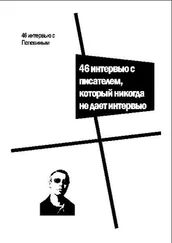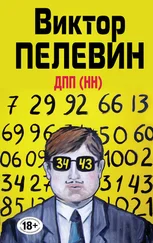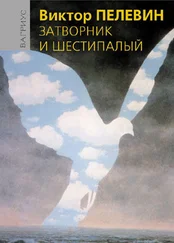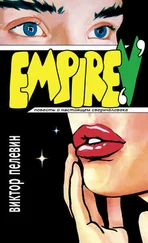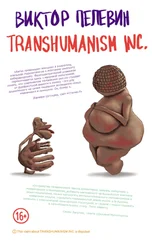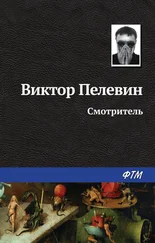Виктор Пелевин - Babylon
Здесь есть возможность читать онлайн «Виктор Пелевин - Babylon» весь текст электронной книги совершенно бесплатно (целиком полную версию без сокращений). В некоторых случаях можно слушать аудио, скачать через торрент в формате fb2 и присутствует краткое содержание. Жанр: Современная проза, на английском языке. Описание произведения, (предисловие) а так же отзывы посетителей доступны на портале библиотеки ЛибКат.
- Название:Babylon
- Автор:
- Жанр:
- Год:неизвестен
- ISBN:нет данных
- Рейтинг книги:5 / 5. Голосов: 1
-
Избранное:Добавить в избранное
- Отзывы:
-
Ваша оценка:
- 100
- 1
- 2
- 3
- 4
- 5
Babylon: краткое содержание, описание и аннотация
Предлагаем к чтению аннотацию, описание, краткое содержание или предисловие (зависит от того, что написал сам автор книги «Babylon»). Если вы не нашли необходимую информацию о книге — напишите в комментариях, мы постараемся отыскать её.
Babylon — читать онлайн бесплатно полную книгу (весь текст) целиком
Ниже представлен текст книги, разбитый по страницам. Система сохранения места последней прочитанной страницы, позволяет с удобством читать онлайн бесплатно книгу «Babylon», без необходимости каждый раз заново искать на чём Вы остановились. Поставьте закладку, и сможете в любой момент перейти на страницу, на которой закончили чтение.
Интервал:
Закладка:
He nodded at the photograph of Gagarin. Tatarsky took a closer look at it and realised it wasn’t Gagarin at all, but General Lebed in dress uniform, and it wasn’t a dove in his hands but a white rabbit with its ears pressed back. The photograph was so similar to its prototype that it produced a kind of trompe I’oeil effect: for a moment the rabbit in Lebed’s hands actually seemed to be an indecently obese pigeon.
‘A young miner did that,’ said Morkovin. ‘It’s for the cover of our Playboy. The slogan to go with it is: " Russia will be glossy and sassy". For the hungry regions it’s spot on, a bull’s eye - instant association with "sausage". The young guy probably only used to eat every other day, and now he’s one of the top creatives. He still tends to focus on food a lot, though…’
‘Hang on,’ said Tatarsky, ‘I’ve got a good idea. Let me just write it down.’
He took his notebook out of his pocket and wrote:
Silicon Graphics amp; big tits - new concept for the Russian market. Instead of a snowflake the outline of an Immense tit that looks like its been filled out with a silicon implant (casually drawn with a pen, for ‘graphics’). In the animation (the clip) an organic silicon worm crawls out of the nipple and curves itself into a $ sign (model on Spedes-II). Think about it.
‘A rush of sweaty inspiration?’ Morkovin asked. ‘I feel envious. OK, the excursion’s over. Let’s go to the canteen.’
The canteen was still empty. The television was playing away with no sound, and their two glasses and unfinished bottle of Smirnoff Citrus Twist were still standing on the table below it. Morkovin filled the glasses, clinked his own glass against Tatarsky’s without saying a word and drank up. The excursion had left Tatarsky feeling vaguely uneasy.
‘Listen,’ he said, ‘there’s one thing I don’t understand. OK, so copywriters write all their texts for them; but who’s responsible for what’s in the texts? Where do we get the subjects from? And how do we decide which way national policy’s going to move tomorrow?’
‘Big business,’ Morkovin answered shortly. ‘You’ve heard of the oligarchs?’
‘Uhuh. You mean, they get together and sort out things? Or do they send in their concepts in written form?’
Morkovin put his thumb over the opening of the bottle, shook it and began gazing at the bubbles - he obviously found something fascinating in the sight. Tatarsky said nothing as he waited for an answer.
‘How can they all get together anywhere,’ Morkovin replied at long last, ‘when all of them are made on the next floor up? You’ve just seen Berezovsky for yourself.’
‘Uhuh,’ Tatarsky responded thoughtfully. ‘Yes, of course. Then who writes the scripts for the oligarchs?’
‘Copywriters. All exactly the same, just one floor higher.’
‘Uhuh. And how do we decide what the oligarchs are going to decide?’
‘Depends on the political situation. "Decide" is only a word, really. In actual fact we don’t have too much choice about it. We’re hemmed in tight by the iron law of necessity. For both sets of them. And for you and me too.’
‘So you mean there aren’t any oligarchs, either? But what about that board downstairs: the Interbank Committee…?’
‘That’s just to stop the filth from trying to foist their protection on us. We’re the Interbank Committee all right, only all the banks are intercommittee banks. And we’re the committee. That’s the way it is.’
‘I get you,’ said Tatarsky. ‘I think I get you, anyway… That is, hang on there… That means this lot determine that lot, and that lot… That lot determine this lot. But then how… Hang on… Then what’s holding the whole lot up?’
He broke off in a howl of pain: Morkovin had pinched him on the wrist as hard as he could - so hard he’d even torn off a small patch of skin.
‘Don’t you ever,’ he said, leaning over the table and staring darkly into Tatarsky’s eyes, ‘not ever, think about that. Not ever, get it?’
‘But how?’ Tatarsky asked, sensing that the pain had thrown him back from the edge of a deep, dark abyss. ‘How can I not think about it?’
"There’s this technique,’ said Morkovin. ‘Like when you realise that any moment now you’re going to think that thought all the way through, you pinch yourself or you prick yourself with something sharp. In your arm or your leg - it doesn’t matter where. Wherever there are plenty of nerve endings. The way a swimmer pricks his calf when he gets cramp. In order not to drown. And then gradually you build up something like a callus around the thought and it’s no real problem to you to avoid it. Like, you can feel it’s there, only you never think it. And gradually you get used to it. The eighth floor’s supported by the seventh floor, the seventh floor’s supported by the eighth floor; and everywhere, at any specific point and any specific moment, things are stable. Then, when the work comes piling in, and you do a line of coke, you’ll spend the whole day on the run fencing concrete problems. You won’t have time left for the abstract ones.’
Tatarsky drained the rest of the vodka in a single gulp and pinched his own thigh several times. Morkovin gave a sad laugh.
‘Take Azadovsky,’ he said, ‘why d’you think he winds everyone up and comes on heavy like that? Because it never even enters his head that there’s something strange in all of this. People like that are only born once in a hundred years. He’s got a real sense of life on an international scale…’
‘All right,’ said Tatarsky, pinching his leg again. ‘But surely someone has to control the economy, not just wind people up and come on heavy? The economy’s complicated. Doesn’t it take some kind of principles to regulate it?’
‘The principle’s very simple,’ said Morkovin. ‘Monetarism. To keep everything in the economy normal, all we have to do is to control the gross stock of money we have. And everything else automatically falls into place. So we mustn’t interfere in anything.’
‘And how do we control this gross stock?’
‘So as to make is as big as possible.’
‘And that’s it?’
‘Of course. If the gross stock of money we have is as big as possible, that means everything’s hunky-dory.’
‘Yes,’ said Tatarsky, ‘that’s logical. But still someone has to run everything, surely?’
‘You want to understand everything far too quickly,’ Morkovin said with a frown. ‘I told you, just wait a while. That, my friend, is a great problem - trying to understand just who’s running things. For the time being let me just say the world isn’t run by a "who", it’s run by a "what". By certain factors and impulses it’s too soon for you to be learning about. Although in fact. Babe, there’s no way you could not know about them. That’s the paradox of it all…’
Morkovin fell silent and began thinking about something. Tatarsky lit a cigarette - he didn’t feel like talking any more. Meanwhile a new client had appeared in the canteen, one that Tatarsky recognised immediately: it was the well-known TV political analyst Farsuk Seiful-Farseikin. In real life he looked a bit older than he did on the screen. He was obviously just back from a broadcast: his face was covered with large beads of sweat, and the famous pince-nez was set crooked on his nose. Tatarsky expected Farseikin to dash over to the counter for vodka, but he came over to their table.
‘Mind if I turn on the sound?’ he asked, nodded towards the television. ‘My son made this clip. I haven’t seen it yet.’
Tatarsky looked up. Something strangely familiar was happening on the screen: there was a choir of rather dubious-looking sailors standing in a clearing in a birch forest (Tatarsky recognised Azadovsky right away - he was standing in the middle of the group, the only one with a medal gleaming on his chest). With their arms round each other’s shoulders, the sailors were swaying from side to side and gently singing in support of a yellow-haired soloist who looked like the poet Esenin raised to the power of three. At first Tatarsky thought the soloist must be standing on the stump of a gigantic birch tree, but from the ideally cylindrical form of the stump and the small yellow lemons drawn on it, he realised it was a soft drinks can magnified many times over and painted to resemble either a birch tree or a zebra. The slick image-sequencing testified that this was a very expensive clip.
Читать дальшеИнтервал:
Закладка:
Похожие книги на «Babylon»
Представляем Вашему вниманию похожие книги на «Babylon» списком для выбора. Мы отобрали схожую по названию и смыслу литературу в надежде предоставить читателям больше вариантов отыскать новые, интересные, ещё непрочитанные произведения.
Обсуждение, отзывы о книге «Babylon» и просто собственные мнения читателей. Оставьте ваши комментарии, напишите, что Вы думаете о произведении, его смысле или главных героях. Укажите что конкретно понравилось, а что нет, и почему Вы так считаете.

